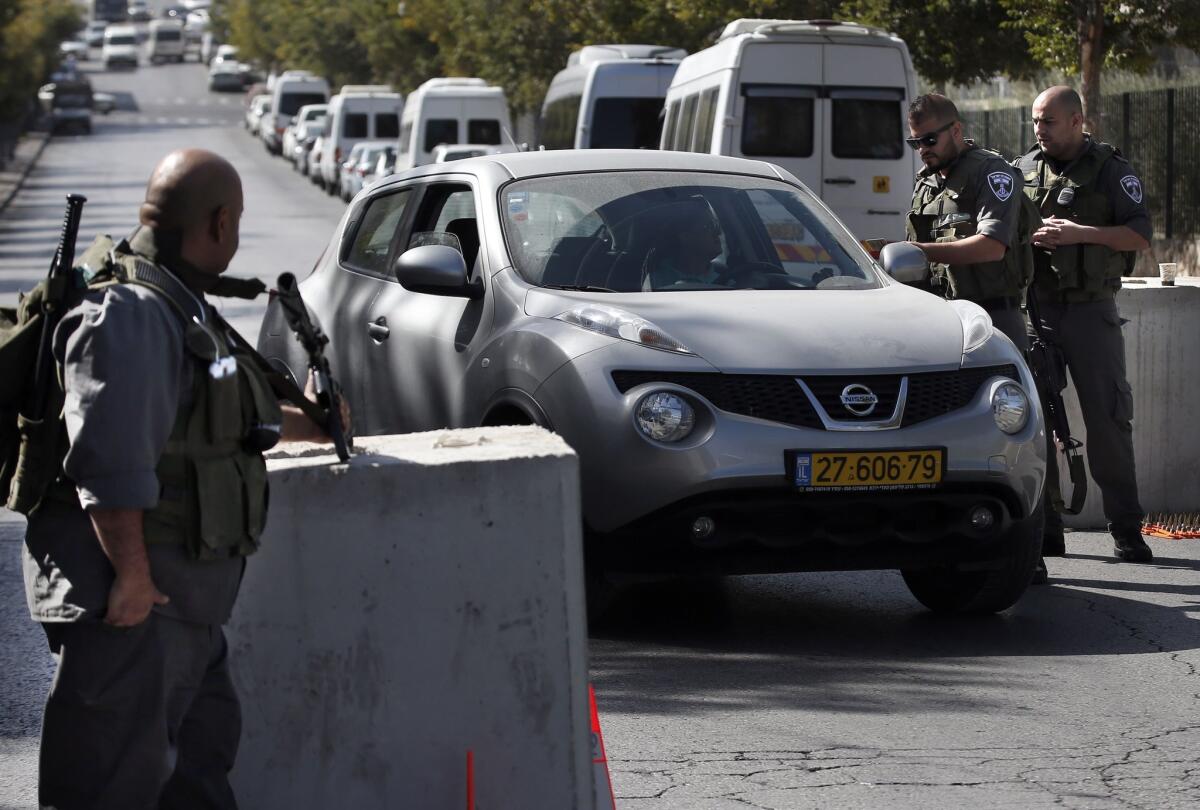Israeli prime minister rejects U.S. criticism of ‘excessive’ force

Israeli security personnel check a Palestinian vehicle at a newly installed road block Thursday in east Jerusalem.
- Share via
Reporting from Jerusalem — Prime Minister Benjamin Netanyahu responded angrily Thursday to U.S. suggestions that Israel might be using excessive force in response to a series of stabbing attacks by Palestinians, saying any other nation would respond in a similar manner.
Israeli officials also refuted claims by Palestinians that a 13-year-old assailant had been killed earlier this week after stabbing and wounding an Israeli boy.
Netanyahu, speaking to reporters Thursday evening, delivered a blistering defense of the frequent use of deadly force by police and bystanders to blunt attacks staged by “people wielding knives, axes, and meat cleavers” that have taken place this month, mainly in Jerusalem, killing seven Israelis.
More than 30 Palestinians have died in the same time span, some in clashes in the West Bank and Gaza Strip.
The State Department had expressed concern about restrictions on movement of some Palestinians living in traditionally Arab east Jerusalem in response to the current wave of attacks, saying it hoped the measures were temporary. Department spokesman John Kirby also referred Wednesday to “some reports of what many would consider excessive use of force” by Israel.
“What would happen in London or Washington or Paris or Rome or anywhere else?” the prime minister demanded. “This allegation is utterly false. It’s also utterly unfair.”
Israel has called for tough new security measures, including revoking the residency rights of those implicated in attacks, the demolition of attackers’ family homes and the deployment of troops alongside police to guard Israeli cities and towns.
Israel has been particularly rattled by near-daily stabbing attacks, which have prompted many people to either stay close to home or exercise great vigilance when out in public. Stores have seen a run on defensive measures such as pepper spray, and social media postings offer advice on how best to treat stab wounds and engage in face-to-face combat.
Thursday also brought a fresh quarrel over Palestinian Authority President Mahmoud Abbas’ claim, in a televised speech Wednesday night, that Israel was “executing our sons in cold blood.” Abbas cited the case of a 13-year-old Palestinian boy who was captured on video as he writhed, injured, on the ground after onlookers intervened in a stabbing attack Monday on a Jewish boy, also 13, who was seriously hurt.
The Palestinian child in the video, however, was not killed; an older cousin who allegedly took part in the attack was. Israel, which has already issued several official statements on the case, on Thursday released footage of the Palestinian boy, Ahmed Manasra, sitting up in his hospital bed and being fed what appeared to be broth.
Attacks have persisted despite roadblocks outside some restive Palestinian areas in Jerusalem. On Wednesday evening, an Israeli woman of about 70 was stabbed and moderately wounded as she waited to board a bus near Jerusalem’s busy central bus station. The Palestinian assailant was shot and killed.
Another Palestinian was killed a short time earlier, on Wednesday afternoon, after he brandished a knife when approached by police near a gate leading to Jerusalem’s Old City, officials said.
Israel has announced the deployment of hundreds of military reservists to help ensure public safety in Israeli cities, including safeguarding buses and trains. Defense Minister Moshe Yaalon and other Israeli officials have urged Israelis with gun licenses to carry firearms to protect themselves, or use other weapons at hand in the event of an attack.
The unrest comes on the heels of months of tensions over the status of a Jerusalem holy site revered by both Muslims and Jews. Palestinians also believe Israel has deliberately sabotaged the long-scuttled peace process in order to have a free hand to continue enlarging Jewish settlements in the West Bank and housing more Jews in east Jerusalem.
Sobelman is a special correspondent.
Follow @laurakingLAT on Twitter for news out of the Middle East
More to Read
Sign up for Essential California
The most important California stories and recommendations in your inbox every morning.
You may occasionally receive promotional content from the Los Angeles Times.













